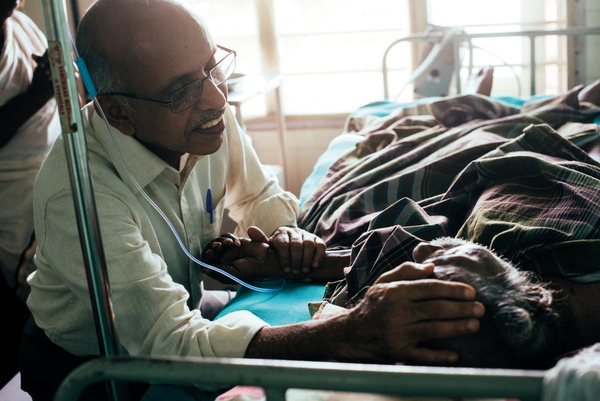When pharmacologist Ravindra Ghooi learned in 1996 that his mother had terminal breast cancer, he began to investigate whether he could obtain morphine, in case she needed pain relief at the end of her life. But a morphine prescription in India at that time, even for the dying, was a rare thing: most states required four or five different licences to buy painkillers such as morphine, and there were harsh penalties for minor administrative errors. Few pharmacies stocked opioids and it was a rare doctor who held the necessary paperwork to prescribe them. Ghooi, who is now a consultant at Cipla Palliative Care and Training Centre in Pune, used his connections to ask government and industry officials if there was a straightforward way of obtaining morphine for his mother. “Everybody agreed to give me morphine,” he recalls, “but they said they’d give it to me illegally.” Continue reading Palliative care: The other opioid issue
All posts by LL
Recopilando el testimonio genético de los muertos de la Guerra Civil española
En una zanja profunda hasta la cintura junto a la Autovía 1 de España, una docena de voluntarios con guantes de goma cepillan arcilla oscura que cubre restos de huesos humanos. Sus rodillas se apoyan sobre cojines de espuma, y una carpa blanca los protege del sol del verano boreal. Es julio de 2011; 75 veranos después de que en España estallara una guerra civil que llevó a los huesos de 59 personas a ese suelo.
A pocos pasos de la zanja, los voluntarios sostienen micrófonos frente al murmullo de los ancianos de la localidad de Gumiel de Izán, en la región centro-norte de Castilla y León. Esos ancianos, que albergan recuerdos de ejecuciones sumarias en ese sitio, bien pueden ser los hermanos menores, los vecinos y los hijos de los que están en esa tumba. Pero al momento de la exhumación, nadie lo sabe a ciencia cierta. En lugar de ello, los voluntarios documentan y recogen los restos físicos, y consiguen y graban las memorias imperfectas que fueron suprimidas durante cuatro décadas de dictadura.
Tales sitios se encuentran esparcidos por toda España, desde las Islas Canarias hasta La Mancha y las Islas Baleares. Las estimaciones recientes sugieren que alrededor de 2.000 fosas comunes pueden guardar los restos de hasta 150.000 víctimas de apresuradas ejecuciones durante la guerra. Continue reading Recopilando el testimonio genético de los muertos de la Guerra Civil española
Unburying the Spanish Civil War
In a waist-high trench alongside Spain’s national Highway 1, a dozen volunteers wearing rubber gloves brush tan clay from crumbling human bones. Their knees rest on foam cushions, and a white tent shades them from the summer sun. It’s July 2011—a full 75 summers after Spain erupted in the Civil War that put the bones of 59 civilians in the ground here.
A few steps away from the trench, volunteers hold microphones up to the murmuring mouths of elders from the town of Gumiel de Izán, in the north-central region of Castilla y León. The elders, who harbor memories of summary executions at the site, may well be the younger siblings, neighbors, and children of those in the grave. But at the moment of exhumation, nobody knows for sure. Instead, the volunteers document and collect the physical remains, coaxing out and recording imperfect memories that were suppressed during four decades of dictatorship.
Such sites are scattered throughout Spain, from the Canary Islands to La Mancha to the Balearic Islands. Recent estimates suggest that some 2,000 mass graves may hold the remains of up to 150,000 victims of hasty wartime executions. Continue reading Unburying the Spanish Civil War
Tropical disease: A neglected cause
He didn’t know it at the time, but when chemist Matthew Todd posted a request for help on The Synaptic Leap, a website devoted to open-source biomedical research, he was sowing the seeds for a rivalry between an open initiative and a contract-research organization hired by the World Health Organization to reach the same goal.
The aim of both projects, run in 2010, was to produce a safer, low-cost version of praziquantel, a treatment for the tropical parasitic infection schistosomiasis. Up until that point, the treatment contained two enantiomers (mirror-image versions of the molecule that have slightly different properties) of praziquantel. One enantiomer has no effect on the parasite, but gives the drug a bitter taste. Eliminating this undesirable form could reduce side effects and help more patients to complete their treatment. The pure drug needed to be affordable. Todd, who is at the University of Sydney in Australia, thought that an open project was the best way to achieve this. “Open is very well-suited for neglected diseases,” he says. “The pay-off of secrecy is not very large.” Continue reading Tropical disease: A neglected cause

